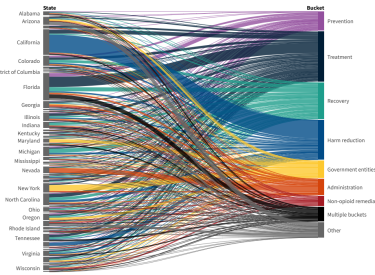
This Week's News in Substance Use: 5/25/18
Treat Addiction Like Cancer , The New York Times
“Another organization, Shatterproof, is working with 16 health insurers, which collectively cover 248 million people, to adopt national principles of care, including universal screening, access to medications and continuing long-term outpatient care. Gary Mendell, Shatterproof’s chief executive, believes that once private insurers recognize these standards and create financial incentives to meet them, the rest of the health care system will follow. It would be good if that included Medicaid and Medicare, which cover 69 percent of Americans’ addiction treatment.
The staggering economics of the opioid epidemic may be what forces our system to change. According to the nonprofit group FAIR Health, which draws on data from more than 21 billion privately billed health care claims, ‘Professional charges and allowed amounts for services for patients diagnosed with opioid [misuse] or dependence rose more than 1,000 percent from 2011 to 2015.”’This increase, partly the result of addiction treatment coverage mandated by the Affordable Care Act, may spur health care systems to create their own treatment centers.”
Predatory Behavior Runs Rampant in Facebook’s Addiction Support Groups , The Verge
“The combination of the opioid crisis and Obamacare, which made it easy to get insurance that covered addiction treatment, has driven a boom in the rehab market. Centers that manage to attract clients with the right insurance policies stand to earn massive profits, and some spend millions of dollars on marketing to do so, often wooing [people with addiction] from around the country to rehab hubs in Florida and Southern California.
“It’s not uncommon for rehabs to use deceptive advertising or offer inducements like plane tickets to people with lucrative policies. Marketers often contract with treatment centers that pay them to bring in clients, whether per head or through a monthly contract. Individual patients are so valuable that the system has spawned a ‘patient brokering’ market, where centers — sometimes illegally — buy and sell the right to treat an individual person.”
She Said She’d Free Them from Addiction. She Turned Them into Her Personal Servants , Reveal News
“Jennifer Warren has spent years recruiting the poor and desperate to her drug rehabilitation program in the mountains outside Asheville, North Carolina. She promised them counseling and recovery for free. When they arrived, she put them to work 16 hours a day for no pay at adult care homes for the elderly and disabled.
“Thrust into the homes with little training or sleep, the rehab participants changed diapers, bathed patients and sometimes dispensed the same prescription drugs that sent them spiraling into addiction in the first place.”
Opioid Crisis Takes a Toll On Economic Outlook for Many Americans, Fed Says , NPR
“Economists are taking seriously the idea that opioid [misuse] and addiction are having an impact on the economy. Alan Krueger, a professor of economics at Princeton University, found in an August 2017 report that as much as 20 percent of the decline of male participation in the labor force could be related to opioid [misuse].
“Other parts of the Fed's new report showed incremental improvement on most issues: 74 percent of adults surveyed said they were doing ‘okay’ or ‘living comfortably’ in 2017. That's up from 60 percent in 2013.”
Do Federal Staffing Shortages Facilitate Opioid Smuggling? The Washington Post
“The opioid crisis knows no bounds.
“Our last Federal Insider column was about President Trump’s long-overdue opioid strategy, which was deemed “missing in action” at a House hearing last week, despite his declaration that the epidemic is a nationwide public health emergency. It kills more than 115 Americans a day.
“Now, a Senate hearing will explore the growing opioid [misuse] among seniors, and a recent report pointed to border staffing shortages that facilitate drug smuggling.”
Use of Forced Rehab on the Rise in Opioid Addiction Battle , Associated Press
“The last thing Lizabeth Loud, a month from giving birth, wanted was to be forced into treatment for her heroin and prescription painkiller addiction.
“But her mother saw no other choice, and sought a judge's order to have her committed against her will. Three years later, Loud said her month in state prison, where Massachusetts sent civilly committed women until recent reforms, was the wake-up call she needed.
‘”I was really miserable when I was there,’ the 32-year-old Boston-area resident said. ‘That was one bottom I wasn't willing to revisit again.’”




